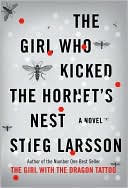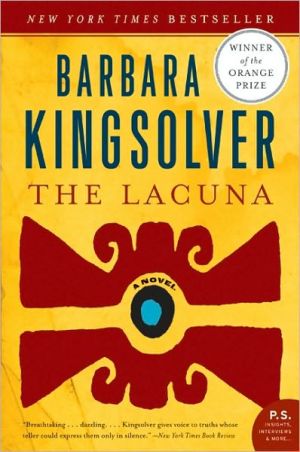The Wind-Up Bird Chronicle
Japan's most highly regarded novelist now vaults into the first ranks of international fiction writers with this heroically imaginative novel, which is at once a detective story, an account of a disintegrating marriage, and an excavation of the buried secrets of World War II.\ In a Tokyo suburb a young man named Toru Okada searches for his wife's missing cat. Soon he finds himself looking for his wife as well in a netherworld that lies beneath the placid surface of...
Search in google:
Japan's most highly regarded novelist now vaults into the first ranks of international fiction writers with this heroically imaginative novel, which is at once a detective story, an account of a disintegrating marriage, and an excavation of the buried secrets of World War II. In a Tokyo suburb a young man named Toru Okada searches for his wife's missing cat. Soon he finds himself looking for his wife as well in a netherworld that lies beneath the placid surface of Tokyo. As these searches intersect, Okada encounters a bizarre group of allies and antagonists: a psychic prostitute; a malevolent yet mediagenic politician; a cheerfully morbid sixteen-year-old-girl; and an aging war veteran who has been permanently changed by the hideous things he witnessed during Japan's forgotten campaign in Manchuria. Gripping, prophetic, suffused with comedy and menace, The Wind-Up Bird Chronicle is a tour de force equal in scope to the masterpieces of Mishima and Pynchon.Chicago TribuneMurukami is a genius.
Book One: The Thieving Magpie June and July 1984\ 1\ Tuesday's Wind-Up Bird\ •\ Six Fingers and Four Breasts\ When the phone rang I was in the kitchen, boiling a potful of spaghetti and whistling along with an FM broadcast of the overture to Rossini's The Thieving Magpie, which has to be the perfect music for cooking pasta.\ I wanted to ignore the phone, not only because the spaghetti was nearly done, but because Claudio Abbado was bringing the London Symphony to its musical climax. Finally, though, I had to give in. It could have been somebody with news of a job opening. I lowered the flame, went to the living room, and picked up the receiver.\ "Ten minutes, please," said a woman on the other end.\ I'm good at recognizing people's voices, but this was not one I knew.\ "Excuse me? To whom did you wish to speak?"\ "To you, of course. Ten minutes, please. That's all we need to understand each other." Her voice was low and soft but otherwise nondescript.\ "Understand each other?"\ "Each other's feelings."\ I leaned over and peeked through the kitchen door. The spaghetti pot was steaming nicely, and Claudio Abbado was still conducting The Thieving Magpie.\ "Sorry, but you caught me in the middle of making spaghetti. Can I ask you to call back later?"\ "Spaghetti? What are you doing cooking spaghetti at ten-thirty in the morning?"\ "That's none of your business," I said. "I decide what I eat and when I eat it."\ "True enough. I'll call back," she said, her voice now flat and expressionless. A little change in mood can do amazing things to the tone of a person's voice.\ "Hold on a minute," I said before she could hang up. "If this is some new sales gimmick, you can forget it. I'm out of work. I'm not in the market for anything."\ "Don't worry. I know."\ "You know? You know what?"\ "That you're out of work. I know about that. So go cook your precious spaghetti."\ "Who the hell—"\ She cut the connection.\ With no outlet for my feelings, I stared at the phone in my hand until I remembered the spaghetti. Back in the kitchen, I turned off the gas and poured the contents of the pot into a colander. Thanks to the phone call, the spaghetti was a little softer than al dente, but it had not been dealt a mortal blow. I started eating—and thinking.\ Understand each other? Understand each other's feelings in ten minutes? What was she talking about? Maybe it was just a prank call. Or some new sales pitch. In any case, it had nothing to do with me.\ After lunch, I went back to my library novel on the living room sofa, glancing every now and then at the telephone.\ What were we supposed to understand about each other in ten minutes? What can two people understand about each other in ten minutes? Come to think of it, she seemed awfully sure about those ten minutes: it was the first thing out of her mouth. As if nine minutes would be too short or eleven minutes too long. Like cooking spaghetti al dente.\ I couldn't read anymore. I decided to iron shirts instead. Which is what I always do when I'm upset. It's an old habit. I divide the job into twelve precise stages, beginning with the collar (outer surface) and ending with the left-hand cuff. The order is always the same, and I count off each stage to myself. Otherwise, it won't come out right.\ I ironed three shirts, checking them over for wrinkles and putting them on hangers. Once I had switched off the iron and put it away with the ironing board in the hall closet, my mind felt a good deal clearer.\ I was on my way to the kitchen for a glass of water when the phone rang again. I hesitated for a second but decided to answer it. If it was the same woman, I'd tell her I was ironing and hang up.\ This time it was Kumiko. The wall clock said eleven-thirty. "How are you?" she asked.\ "Fine," I said, relieved to hear my wife's voice.\ "What are you doing?"\ "Just finished ironing."\ "What's wrong?" There was a note of tension in her voice. She knew what it meant for me to be ironing.\ "Nothing. I was just ironing some shirts." I sat down and shifted the receiver from my left hand to my right. "What's up?"\ "Can you write poetry?" she asked.\ "Poetry!?" Poetry? Did she mean . . . poetry?\ "I know the publisher of a story magazine for girls. They're looking for somebody to pick and revise poems submitted by readers. And they want the person to write a short poem every month for the frontispiece. Pay's not bad for an easy job. Of course, it's part-time. But they might add some editorial work if the person—"\ "Easy work"? I broke in. "Hey, wait a minute. I'm looking for something in law, not poetry."\ "I thought you did some writing in high school."\ "Yeah, sure, for the school newspaper: which team won the soccer championship or how the physics teacher fell down the stairs and ended up in the hospital—that kind of stuff. Not poetry. I can't write poetry."\ "Sure, but I'm not talking about great poetry, just something for high school girls. It doesn't have to find a place in literary history. You could do it with your eyes closed. Don't you see?"\ "Look, I just can't write poetry—eyes open or closed. I've never done it, and I'm not going to start now."\ "All right," said Kumiko, with a hint of regret. "But it's hard to find legal work."\ "I know. That's why I've got so many feelers out. I should be hearing something this week. If it's no go, I'll think about doing something else."\ "Well, I supposed that's that. By the way, what's today? What day of the week?"\ I thought a moment and said, "Tuesday."\ "Then will you go to the bank and pay the gas and telephone?"\ "Sure. I was just about to go shopping for dinner anyway."\ "What are you planning to make?"\ "I don't know yet. I'll decide when I'm shopping."\ She paused. "Come to think of it," she said, with a new seriousness, "there's no great hurry about your finding a job."\ This took me off guard. "Why's that?" I asked. Had the women of the world chosen today to surprise me on the telephone? "My unemployment's going to run out sooner or later. I can't keep hanging around forever."\ "True, but with my raise and occasional side jobs and our savings, we can get by OK if we're careful. There's no real emergency. Do you hate staying at home like this and doing housework? I mean, is this life so wrong for you?"\ "I don't know," I answered honestly. I really didn't know.\ "Well, take your time and give it some thought," she said. "Anyhow, has the cat come back?"\ The cat. I hadn't thought about the cat all morning. "No," I said. "Not yet."\ "Can you please have a look around the neighborhood? It's been gone over a week now."\ I gave a noncommittal grunt and shifted the receiver back to my left hand. She went on:\ "I'm almost certain it's hanging around the empty house at the other end of the alley. The one with the bird statue in the yard. I've seen it in there several times."\ "The alley?" Since when have you been going to the alley? You've never said anything—"\ "Oops! Got to run. Lots of work to do. Don't forget about the cat."\ She hung up. I found myself staring at the receiver again. Then I set it down in its cradle.\ I wondered what had brought Kumiko to the alley. To get there from our house, you had to climb over a cinder-block wall. And once you'd made the effort, there was no point in being there.\ I went to the kitchen for a glass of water, then out to the veranda to look at the cat's dish. The mound of sardines was untouched from last night. No, the cat had not come back. I stood there looking at our small garden, with the early-summer sunshine streaming into it. Not that ours was the kind of garden that gives you spiritual solace to look at. The sun managed to find its way in there for the smallest fraction of each day, so the earth was always black and moist, and all we had by way of garden plants were a few drab hydrangeas in one corner—and I don't like hydrangeas. There was a small strand of trees nearby, and from it you could hear the mechanical cry of a bird that sounded as if it were winding a spring. We called it the wind-up bird. Kumiko gave it the name. We didn't know what it was really called or what it looked like, but that didn't bother the wind-up bird. Every day it would come to the stand of trees in our neighborhood and wind the spring of our quiet little world.\ So now I had to go cat hunting. I had always liked cats. And I liked this particular cat. But cats have their own way of living. They're not stupid. If a cat stopped living where you happened to be, that meant it had decided to go somewhere else. If it got tired and hungry, it would come back. Finally, though, to keep Kumiko happy, I would have to go looking for our cat. I had nothing better to do.\ •\ I had quit my job at the beginning of April—the law job I had had since graduation. Not that I had quit for any special reason. I didn't dislike the work. It wasn't thrilling, but the pay was all right and the office atmosphere was friendly.\ My role at the firm was—not to put too fine a point on it—that of professional gofer. And I was good at it. I might say I have a real talent for the execution of such practical duties. I'm a quick study, efficient, I never complain, and I'm realistic. Which is why, when I said I wanted to quit, the senior partner (the father in this father-and-son law firm) went so far as to offer me a small raise.\ But I quit just the same. Not that quitting would help me realize any particular hopes or prospects. The last thing I wanted to do, for example, was shut myself up in the house and study for the bar exam. I was surer than ever that I didn't want to become a lawyer. I knew, too, that I didn't want to stay where I was and continue with the job I had. If I was going to quit, now was the time to do it. If I stayed with the firm any longer, I'd be there for the rest of my life. I was thirty years old, after all.\ I had told Kumiko at the dinner table that I was thinking of quitting my job. Her only response had been, "I see." I didn't know what she meant by that, but for a while she said nothing more.\ I kept silent too, until she added, "If you want to quit, you should quit. It's your life, and you should live it the way you want to." Having said this much, she then became involved in picking out fish bones with her chopsticks and moving them to the edge of her plate.\ Kumiko earned pretty good pay as editor of a health food magazine, and she would occasionally take on illustration assignments from editor friends at other magazines to earn substantial additional income. (She had studied design in college and had hoped to be a freelance illustrator.) In addition, if I quit I would have my own income for a while from unemployment insurance. Which meant that even if I stayed home and took care of the house, we would still have enough extras such as eating out and paying the cleaning bill, and our lifestyle would hardly change.\ And so I had quit my job.\ •\ I was loading groceries into the refrigerator when the phone rang. The ringing seemed to have an impatient edge to it this time. I had just ripped open a plastic pack of tofu, which I set down carefully on the kitchen table to keep the water from spilling out. I went to the living room and picked up the phone.\ "You must have finished your spaghetti by now," said the woman.\ "You're right. But now I have to go look for the cat."\ "That can wait for ten minutes, I'm sure. It's not like cooking spaghetti."\ For some reason, I couldn't just hang up on her. There was something about her voice that commanded my attention.\ "OK, but no more than ten minutes."\ "Now we'll be able to understand each other," she said with quiet certainty. I sensed her settling comfortable into a chair and crossing her legs.\ "I wonder," I said. "What can you understand in ten minutes?"\ "Ten minutes may be longer than you think," she said.\ "Are you sure you know me?"\ "Of course I do. We've met hundreds of times."\ "Where? When?"\ "Somewhere, sometime," she said. "But if I went into that, ten minutes would never be enough. What's important is the time we have now. The present. Don't you agree?"\ "Maybe. But I'd like some proof that you know me."\ "What kind of proof?"\ "My age, say?"\ "Thirty," she answered instantaneously.\ "Thirty and two months. Good enough?"\ That shut me up. She obviously did know me, but I had absolutely no memory of her voice.\ "Now it's your turn," she said, her voice seductive. "Try picturing me. From my voice. Imagine what I'm like. My age. Where I am. How I'm dressed. Go ahead."\ "I have no idea," I said.\ "Oh, come on," she said. "Try."\ I looked at my watch. Only a minute and five seconds had gone by. "I have no idea," I said again.
\ From Barnes & NobleThe Barnes & Noble Review\ An ancient well. A wind-up bird. A missing cat. A pair of psychic sisters. Like portents in a dream, animals, images, and people materialize and vanish throughout Haruki Murakami's ambitious, Kafkaesque new novel. Alternately alienating and seductive, the narrative's effect on the reader is one of profound disorientation: Where, Murakami asks, does the line between fantasy and reality lie? How responsible are individuals for atrocities their country committed in the past? And can the overwhelming power of history in fact change the course of the present? \ These questions and others are filtered through Murakami's narrator, a gentle, 30-something ex-law firm gofer named Toru Okada. Okada has recently quit his job, lives in suburban Tokyo with his wife, Kumiko, and cat, Noboru Wataya (named after his despised brother-in-law, a politician on the rise). Singularly unambitious, he spends his days cooking and cleaning, until one day, suddenly, his cat disappears, unleashing an avalanche of bizarre events. Okada begins receiving obscene phone calls. Next he encounters the mysterious Malta Kano and her younger sister Creta, a former prostitute who has graduated to become a "prostitute of the mind," seducing strangers in their dreams. The tragedies of Creta's life were catalyzed, she claims, by her "defilement" by Okada's brother-in-law — an incident that sapped her completely of her identity. Soon after, Kumiko inexplicably abandons Okada, who, unmoored, befriends his adolescent neighbor, May Kasahara, a high school dropout who conducts sidewalk surveys for a wig manufacturer.\ Eventsbecome yet more surreal when Okada discovers a dry well on the grounds of a neighboring house and begins descending it regularly in search of solitude. In its depths, he discovers he can "pass through" the subterranean well wall, accessing a hotel room that may or may not be a figment of his imagination. (Did I mention that psychoanalysts will love this novel?) In the room he is seduced by an unnamed woman, an encounter that leaves his cheek marked with a feverish deep blue spot, a stigma that later links him to the story of another marked man, a Japanese veterinarian, in a Manchurian zoo in the waning days of World War II.\ The Wind-Up Bird Chronicle is not just the story of Okada's descent (or perhaps ascent) into the surreal, however. The narrative is a pastiche of the stories of all the characters who appear in Okada's life: among others, Creta Kano, May Kasahara, and Lieutenant Mamiya, the ex-soldier who fought in the war with Mr. Honda, a now-deceased family friend of the Okadas. Each is seeking to understand a certain hollowness at the core of their beings. And each of their stories presents an elegant riddle, full of symbols, signs, and events that echo details in each other's tales, giving the narrative a dense, Rashomon-like quality. Mamiya's chapters describing his experiences in outer Mongolia during World War II are particularly mesmerizing. After watching a fellow officer, Yamamoto, being skinned alive, Mamiya is thrown into a well and left for dead, where he experiences an epiphany that he later recounts to Okada.\ \ What I wanted to convey to you was my feeling that real life may have ended for me deep in that well in the desert of Outer Mongolia. I feel as if, in the intense light that shone for a mere ten or fifteen seconds a day in the bottom of the well, I burned up the very core of my life.... [A]s honestly and simply as I can state it, no matter what I have encountered, no matter what I have experienced since then, I ceased to feel anything in the bottom of my heart. Even in the face of those monstrous Soviet tank units...a kind of numbness was all I felt. Something inside me was already dead. Perhaps as I felt at the time, I should have died in that light, simply faded away. That was the time for me to die. But, as Mr. Honda had predicted, I did not die there. Or perhaps I should say that I could not die there.\ Okada himself experiences that same emptiness decades later at the bottom of his neighborhood well:\ \ It felt extremely strange not to be able to see my own body with my own eyes, though I knew it must be there. Staying very still in the darkness, I became less and less convinced of the fact that I actually existed.... My body began to lose its density and weight, like sand gradually being washed away by flowing water. I felt as if a fierce and wordless tug-of-war were going on inside me, a contest in which my mind was slowly dragging my body into its own territory.... The thought struck me that my own body was a mere provisional husk that had been prepared for my mind by a rearrangement of the signs known as chromosomes. If the signs were rearranged yet again, I would find myself inside a wholly different body than before. "Prostitute of the mind," Creta Kano had called herself. I no longer had any trouble accepting the phrase....\ This sense of incorporeality, of the permeable membrane between substance and air, flesh and fantasy, reality and dream, pervades the book. As a set piece, the skinning of Yamamoto is a literal — and grotesque — representation of the book's persistent themes: What constitutes identity? What lies beneath our surfaces? What separates us from one another? If the "Wind-Up Bird Chronicle" is occasionally too cryptic, it is also true that the philosophical labyrinth Murakami has created is rich and engrossing. (One other quibble: The book is too long and could have benefited from additional editing.) When Okada, in one chapter, is given a present left for him by the now-deceased Mr. Honda, he unwraps layer after layer of carefully sealed wrapping paper only to discover an empty box. Improvise your own meanings, Murakami seems to dare us. In doing so, he is rapidly becoming one of the most provocative novelists at work today.\ —Sarah Midori Zimmerman is a writer and editor in New York City.\ \ \ \ \ \ Chicago TribuneMurukami is a genius.\ \ \ Laura MillerFor a guy who rarely leaves his own block, Toru Okada, the decent, if hapless, hero of Haruki Murakami's new novel, The Wind-Up Bird Chronicle, has a lot of adventures. At the book's beginning, he's left his job as a paralegal and spends his days reading and cooking dinner for his magazine editor wife. First, an obscene phone call from a woman who seems to know him awfully well disrupts his sleepy routine. Then he meets Malta Kano, an enigmatic psychic who's supposedly searching for his lost cat; her sister, Creta, who dresses like Jackie Kennedy and relates a life history of overwhelming physical pain, attempted suicide, prostitution and a traumatic encounter with Toru's sinister brother-in-law, Noboru Wataya; Lt. Mamiya, a WWII vet who tells him of the atrocities he witnessed on the Mongolian front and Soviet prison camps; and, eventually, an extremely well-dressed mother-son duo who introduce him to an unusual way of making lots of cash. When he needs a break, he pals around with the 16-year-old girl who lives down the street -- or mulls things over while sitting at the bottom of a dry well behind a vacant house.\ Murakami is that unusual creature, a metaphysical novelist with a warm, down-to-earth voice and a knack for creating credible characters and spinning a lively yarn. Best known in this country for his 1989 novel A Wild Sheep Chase, Murakami leavens the arresting philosophical symbolism of modern Japanese fiction with a goofy sensibility shaped by American pop culture -- he's like Paul Auster with a heart and a sense of humor. From the beginning, The Wind-Up Bird Chronicle has the easy authority of the work of a natural-born storyteller, and each eccentric character and odd development only adds to the anticipation that Murakami will tie it all up in a satisfying resolution. He expertly twines themes of suffering and inner emptiness with Toru's covert battle against the evil Noboru Wataya, an economic pundit of slippery charisma. Profoundly vacant, Wataya realizes that "consistency and an established worldview were excess baggage in the intellectual mobile warfare that flared up in the mass media's tiny time segments." He parlays this cunning into a political career, of course. Wataya is the precise opposite of the humble Toru, and at first this appears to be the sole source of their antipathy.\ The first 600 pages of The Wind-Up Bird Chronicle offer much unadulterated reading pleasure, and it's only as the remaining pages grow ominously sparse that the proverbial sinking feeling sets in. Even if he does provide for Toru, Murakami can't, in the end, gather all his novel's intriguing subplots and mysterious minor characters together convincingly, and he summarily drops whole handfuls of loose ends. Like the mark in a brilliant con game, I closed The Wind-up Bird Chronicle feeling somewhat bereft, but still so dazzled by Murakami's skill that I couldn't quite regret having come along for the ride. -- Salon\ \ \ \ \ \ Publishers WeeklyAmazingly long, incredibly pricey, wildly experimental, often confusing but never boring, Murakami's most famous novel has been brought to audio life with extreme dedication: by Naxos, a company that regularly wins prizes, and by a reader with an uncommon combination of skills. Degas is already a Murakami veteran, having read the audio version of A Wild Sheep Chase(Naxos), and has worked on radio, stage and even cartoon voice (including Mr. Bean). He catches the constantly changing mental landscape of Murakami's fertile imagination—which moves from detective story to explicit sexual fantasy, heartbreaking Japanese WWII historical flashback, everyday details of married life (cooking, shopping and pet care) and even the occasional burst of satiric humor. Degas treats it all with the clarity and calmness of a very deep, very still pool. Certainly not for everyone's taste or budget, but anyone interested in this important author will find something to enlighten them. Available as a Vintage paperback (Reviews, Aug. 18. 1997). (Nov.)\ Copyright 2007 Reed Business Information\ \ \ \ \ Chicago TribuneMurukami is a genius.\ \ \ \ \ Jamie JamesMurakami has written a bold and generous book. -- The New York Times Book Review\ \ \ \ \ NewsweekMagnificent. . . .[Murakami] has taken a pre-millennial swing for the fences a la David Foster Wallace and Don DeLillo.\ \ \ \ \ Kirkus ReviewsNot merely a big book from the broadly respected Murakami (Dance Dance Dance, 1994), but a major work bringing signature themes of alienation, dislocation, and nameless fears through the saga of a gentle man forced to trade the familiar for the utterly unknown.\ Narrator Toru Okada quit his law-office job in Tokyo. Then he and his wife Kumiko lost their cat. Then Kumiko goes to work one day, and he never sees her again. The loss is overwhelming, but when two psychic sisters take an interest in Okada, to the point of entering his dreams, and a teenage neighbor shares with him her obsession with death, to the point of almost killing him, Okada realizes he's into something over his head. Of course, if he hadn't climbed into the dry well of a nearby vacant house, the teenager wouldn't have had a chance to get at him—and neither would he have had an out-of-body experience that left him with a bluish mark the size of a baby's palm on his cheek. And if he hadn't heard the chilling reminiscence of an old soldier who'd been thrown by his captors into a well in the Mongolian desert at the start of WW II, he never would have wanted to see for himself what a well-bottom was like. And if he hadn't married Kumiko, he wouldn't have the ire of her powerful, venomous brother now turned on him. And yet even so, suddenly, subtly, Okada's fortunes change: Brought through the mark on his cheek into an alliance with another team of psychics, this one mother and son, he acquires the vacant house and its well—and moves deliberately toward a confrontation with the evil that took Kumiko away and all but destroyed him.\ On a canvas stretched from Manchuria to Malta, and with sound effectsfrom strange birdcalls to sleigh bells in cyberspace, this is a fully mature, engrossing tale of individual and national destinies entwined. It will be hard to surpass.\ \ \








